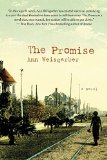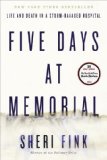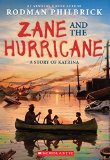Summary | Excerpt | Reading Guide | Reviews | Beyond the book | Read-Alikes | Genres & Themes | Author Bio

Canadian author, Lucy Maud Montgomery of Anne of Green Gables fame, once wrote that "...all things great are wound up with all things little." In the midst of catastrophe, there are myriad personal stories that are unrecognized and, more often than not, remain unrecorded.
Take for example, the horrific loss of RMS Titanic in April 1912. In the 1997 blockbuster film, it is not the sinking per se that had most of us engaged, it was young Rose deWitt Bukater, the two men vying for her affections, and the machinations of her supremely conniving mother. The accident was tragic, of course, but viewers were more caught up in Rose's transformation and the unfolding of a pathway to an entirely new life.
Ann Weisgarber's novel, The Promise, rides on just such a premise. In this case the event is the Galveston, Texas hurricane of September 8-9, 1900, still classified by the National Oceanic and Atmospheric Administration as the deadliest natural disaster in U.S. history. The storm acts as backdrop as the reader becomes entwined in the story of pianist Catherine Wainwright; her childhood admirer, Oscar Williams; his son Andre; and Oscar's taciturn housekeeper, Nan Ogden.
Prim and proper Catherine finds herself embroiled in a terrible scandal in her hometown of Dayton, Ohio. Shunned by society and abandoned by her family, she faces destitution and in desperation begins a correspondence with Oscar. Though they have not been in touch for twelve years, Catherine knows through the grapevine that Oscar now owns a dairy farm on Galveston Island in Texas and has been recently widowed and left with a five-year-old son. Catherine hopes that Oscar will ask her to come to Texas and marry him – and he does. He says in his proposal letter: "…my son is in need of a mother. I am in need of a wife."
A thousand miles from home, Catherine is ill-prepared for the life that awaits her in Galveston, which, by her standards, is hopelessly backward and primitive. The weather is stiflingly hot, the mosquitoes numerous and vicious. And over everything, like a heavy dark quilt, the spirit of Oscar's first wife, Bernadette, still hovers. So too, although Catherine is not at first aware of it, does the promise. As it turns out, on her deathbed, Bernadette had extracted a pledge from her best friend Nan Ogden that she would look after Oscar and be a mother to little Andre. Nan agrees with Oscar as a silent witness at the bedside. Nan has hidden feelings for Oscar, and the arrival of the second Mrs. Williams comes as an extremely unpleasant surprise. Thus is set in motion, an ever-changing web of emotions for all three characters, irrevocably bound as they are by secrets from the past.
And then comes the hurricane. It rains. And rains. And rains. As the water rises and the sand-hill barricades wash away, Catherine, Oscar and Nan are each faced with a crisis far bigger than their personal wants and desires –which they must now put behind them and join together in a fight for survival.
Nan and Catherine alternate telling their stories, describing their feelings for the man who stands between them, seemingly oblivious of their attentions. The narrative style is fascinating as it enables the reader to observe the same incident from two very different perspectives. Nan, the hardscrabble country girl used to heavy work and a simple way of living, has a much more realistic view of life than the sheltered, spoiled Catherine with her high society ways and need for instant gratification. Between them there is Oscar, of course, but also the child Andre, grieving for his mother and not understanding why his father has brought a strange woman into his life. He too is torn between "M'am," as he calls her and the loving but firm "Miss Nan," whom he has known all his life.
The Promise is a gripping, tautly woven story of love, loss, pain and struggle. It is a fascinating hodgepodge of churning emotions and grace (or lack of it) under pressure. It leads readers to wonder if in the wake of nature's supreme power and devastation, any of the characters will ever be what they once were.
"It was a sorrowful time, there's no other way to put it" one of the characters says. "What the storm did was cruel and I won't ever forgive it. The storm did what it wanted and then blew itself out, leaving us to try to put things right."
![]() This review was originally published in The BookBrowse Review in April 2014, and has been updated for the
May 2015 edition.
Click here to go to this issue.
This review was originally published in The BookBrowse Review in April 2014, and has been updated for the
May 2015 edition.
Click here to go to this issue.

If you liked The Promise, try these:

by Sheri Fink
Published 2016
Pulitzer Prize winner Sheri Fink's landmark investigation of patient deaths at a New Orleans hospital ravaged by Hurricane Katrina and suspense-filled portrayal of the quest for truth and justice.

by Rodman Philbrick
Published 2015
Newbery Honor author Rodman Philbrick presents a gripping yet poignant novel about a 12-year-old boy and his dog who become trapped in New Orleans during the horrors of Hurricane Katrina.
Your guide toexceptional books
BookBrowse seeks out and recommends the best in contemporary fiction and nonfiction—books that not only engage and entertain but also deepen our understanding of ourselves and the world around us.